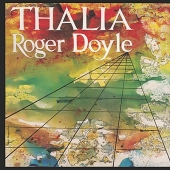
Doyle Roger
Thalia
Label: Pre-cert Home Entertainment
Genre: 80s Wave / Rock / Pop / Punk
Availability
- LP x2 €27.99 Out of Stock
Arguably one of the most important experimental records to emerge from 20th century Ireland, ‘Thalia’ is coveted for its inventive, unpredictable, near-psychedelic brilliance, yet has remained scarce due to major label politics, meaning listeners either had to fork out a ton for a 2nd hand copy, or make do with a 2002 CD compilation of ‘Oizzo No’ and ’Thalia.’
Now finally available on its intended format, the keening, breezy logic and abstract dramaturgy of Doyle’s work on ‘Thalia’ has been reshuffled to highlight its apparent surreality and frolicking apparitions. Combining his studious research and prep work at Utrecht Institute of Sonology (then home to Roland Kayn, Leo Küpper, Jaap Vink) and the studios of Finnish Radio (Yleisradio) Helsinki with a finely honed improvisational intuition at his home studio in Malahide, Dublin, the record yields a poetic diffusion of electro-acoustic phantasms meshed with politicised and unsettling field recordings, alongside a playfully experimental solo piano piece.
The 3-part title track is the biggest attraction on ‘Thalia.’ Acting as a sort of shamanic extension of Gaelic bardic traditions, Doyle guides the listener through labyrinthine dimensions, vacillating cartoonish tape FX with stark synth pulses, fragments of ‘Danny Boy’ and the unsettling sound of a woman wailing or even keening (a lament for the dead) in only the first minutes, the piece spirals over two sides between obtuse electronics and jump-cuts to melancholy strums, airborne melody and rabid dissonance with the natural quality of Ireland’s ever-shifting interplay of sun, rain and clouds. The relatively brief ‘Baby Grand’ follows as a sort of playful solo piano palate cleanser for the LP’s purest electronic piece ‘Solar Eyes’, which surely recalls to some degrees the iridescent expanses of Roland Kayn or Jaap Vink’s cybernetic music as much as Coil’s ‘pHILM #1’ as ELpH.
